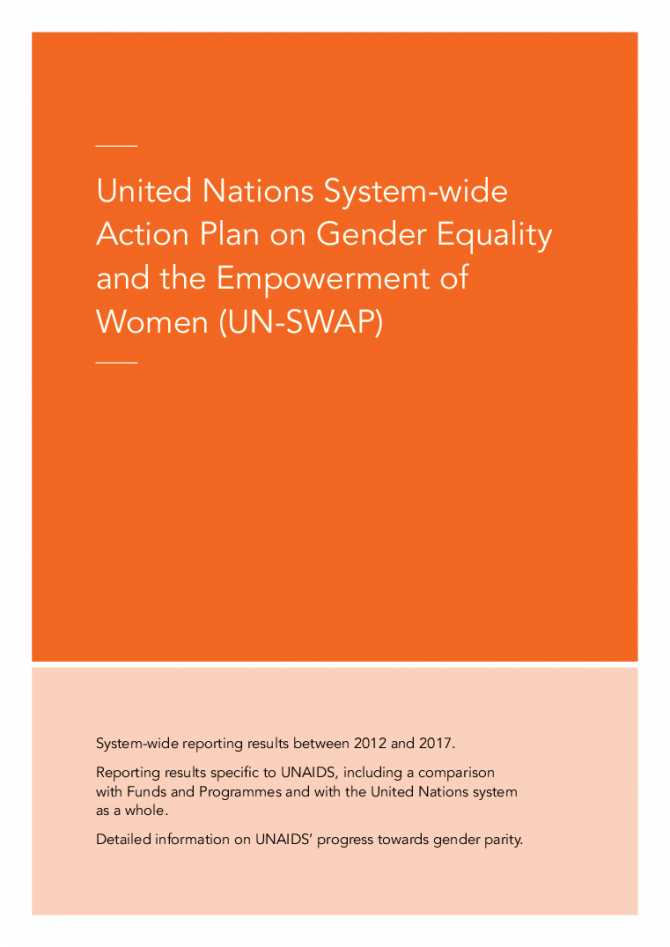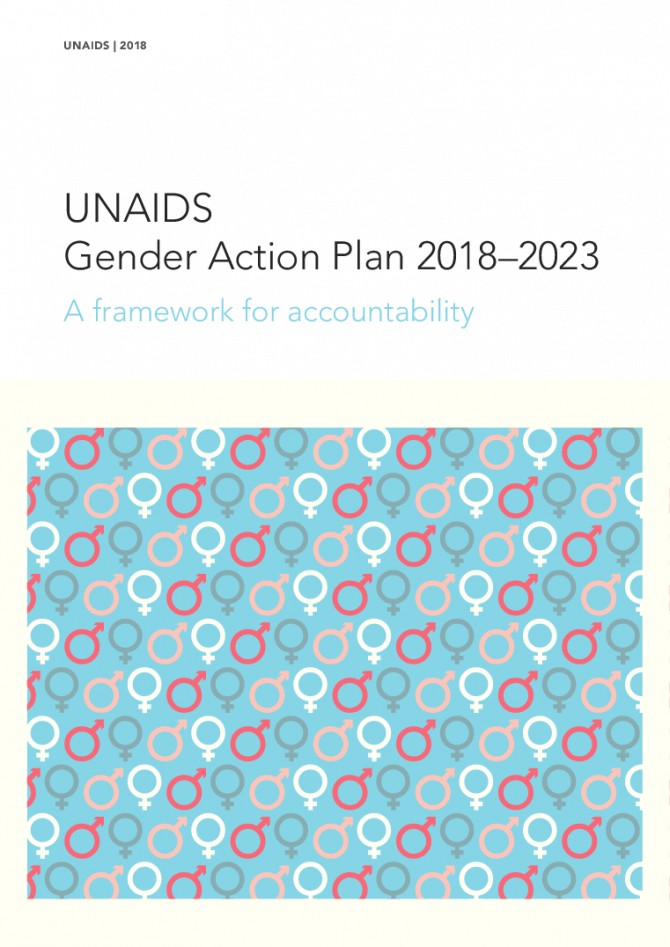
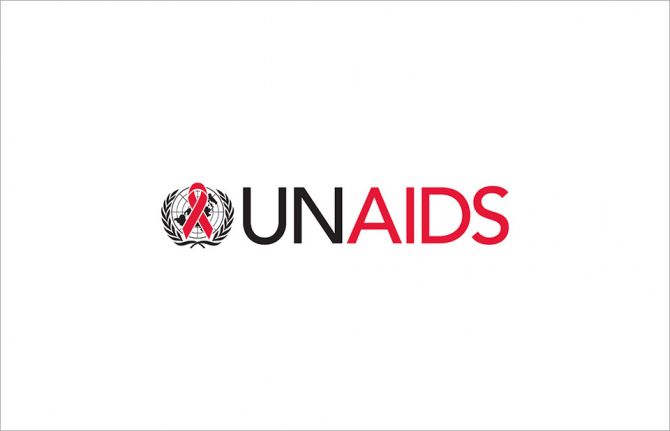
Press Release
UNAIDS puts forward a transformative agenda to create a model working environment at UNAIDS
07 December 2018 07 December 2018UNAIDS outlines five key components for action that build on recommendations made by an Independent Expert Panel
GENEVA, 7 December 2018—UNAIDS is putting in place an agenda for change to transform UNAIDS into a model working environment for all staff that ensures safety and inclusivity and upholds the highest standards of accountability and integrity. The agenda underscores that harassment, including sexual harassment, bullying and abuse of power at any level, will not be tolerated and that perpetrators will be held accountable for their actions.
The agenda is based on a survivor-centred approach to harassment and will ensure that all staff are trained, equipped and supported to call out incivility, sexism, intolerance and other undesirable and unacceptable behaviours. It will strengthen management systems to fit the demands of a decentralized organization and ensure that decision-making happens at the right levels, with full transparency and internal controls for compliance with policies and standards.
The agenda builds on a strong body of work already under way to create a model working environment and draws on recommendations made by an Independent Expert Panel. The Panel was called for by the Executive Director of UNAIDS in February 2018 to provide recommendations on how to further strengthen the implementation of UNAIDS’ zero tolerance policy on sexual harassment.
The Panel’s recommendations and the UNAIDS Secretariat management response and agenda for change will be presented to the UNAIDS Programme Coordinating Board on the first day of its 43rd meeting, which will take place from 11 to 13 December 2018.
“Driven by the AIDS crisis, UNAIDS has been a model for harmonized, system-wide efforts in the United Nations. Today, inspired by the #MeToo movement, we aim to be a model workplace, for the United Nations system and beyond,” said Michel Sidibé, Executive Director of UNAIDS. “Staff are our main asset and they must be able to perform their functions in a safe, enabling and nurturing environment. This transformation will ensure that we can attract the greatest talent and further empower our staff to deliver on our crucial mandate.”
The agenda for change focuses on five key action areas: a staff-centred approach, compliance and standards, leadership and governance, management and capacity. Each area outlines a set of actions the UNAIDS Secretariat will undertake.
In line with its staff-centred approach, the agenda for change will include active bystander training to ensure that everyone in UNAIDS feels equipped and supported to call out incivility, sexism, intolerance and other undesirable and unacceptable behaviours. It will also establish mechanisms for confidential referral to survivor-centred counselling, expand the cadres of Dignity at Work Advisers and provide skills-building for all staff on preventing and addressing harassment, ethics and integrity, knowing your rights at work, diversity and inclusion.
A key component is the recommendation by the Panel to establish an external and independent investigation, disciplinary and redressal system, and UNAIDS will work with stakeholders, including survivors and women’s rights experts, to examine options to take this forward.
UNAIDS will be strengthening its senior management capacity by implementing a new process for the selection of UNAIDS Country Director positions, which it will look to expand to all other senior director-level appointments. This will ensure that UNAIDS’ leaders have the right mix of skills and experience to manage staff as well as skills and experience in technical areas.
In addition, UNAIDS will be implementing a 360-degree feedback mechanism in management appraisals for director-level staff to assess competency in managing people and resources and to detect signals of mismanagement and unacceptable behaviours.
To continue to show greater transparency, UNAIDS will publish reports on disciplinary and accountability actions taken and will proactively refer cases of suspected sexual harassment, harassment, bullying and abuse of power.
UNAIDS will also continue to drive implementation of the United Nations System-Wide Action Plan on Gender Equality and the Empowerment of Women, as well as the updated Gender Action Plan, to build on the significant achievements made in recent years and advance progress towards the new, far-reaching targets set by UNAIDS.
In its findings, the Panel made observations about the UNAIDS leadership and called for change. “I have taken on board the criticisms made by the Panel,” said Mr Sidibé. “In proposing this agenda, I am confident that we can focus on moving forward. I will spend the next 12 months implementing this agenda for change and making the UNAIDS workplace one where everyone feels safe and included.”
The report also highlights that the global AIDS response has witnessed major successes under the leadership of Mr Sidibé. His call for the elimination of new HIV infections among children galvanized action, and significant reductions in new HIV infections have been achieved in all parts of world. Eleven countries have already eliminated new HIV infections among children.
Similarly, during this period, the UNAIDS 90–90–90 targets have propelled a major movement for HIV treatment access. Today, more than 21.7 million people are accessing life-saving antiretroviral therapy, compared to just over 5 million at the end of 2008.
UNAIDS has actively supported civil society engagement, championed human rights, and advocated for the rights of sex workers, gay men and other men who have sex with men, people who inject drugs, transgender men and women, prisoners and migrants to access HIV services. The Executive Director has made the rights of women and girls a priority, including access to sexual and reproductive health services, eliminating gender-based violence and removing harmful gender norms.
Today there is greater freedom of movement for people living with HIV as UNAIDS has worked with countries to remove travel restrictions. HIV and health issues have been kept at the top of political agendas. UNAIDS pioneered the concept of global solidarity and shared responsibility, and today more than half of all resources invested in low- and middle-income countries come from domestic sources. UNAIDS’ agenda for change will be critical in ensuring that UNAIDS staff can continue to contribute to these extraordinary results.
UNAIDS is resolute in its commitment to lead by example in eliminating all forms of harassment, bullying and abuse of power at UNAIDS by creating a respectful, transparent and accountable environment that enables all staff to contribute their full potential to deliver for the people they serve.
Report of the Independent Expert Panel on prevention of and response to harassment, including sexual harassment, bullying and abuse of power at UNAIDS Secretariat:
http://www.unaids.org/en/resources/documents/2018/report-iep
Transforming UNAIDS, an agenda for eliminating all forms of harassment and upholding dignity, accountability and well-being in the workplace. UNAIDS management response to the Independent Expert Panel report
http://www.unaids.org/en/resources/documents/2018/management-response-to-iep-report
UNAIDS
The Joint United Nations Programme on HIV/AIDS (UNAIDS) leads and inspires the world to achieve its shared vision of zero new HIV infections, zero discrimination and zero AIDS-related deaths. UNAIDS unites the efforts of 11 UN organizations—UNHCR, UNICEF, WFP, UNDP, UNFPA, UNODC, UN Women, ILO, UNESCO, WHO and the World Bank—and works closely with global and national partners towards ending the AIDS epidemic by 2030 as part of the Sustainable Development Goals. Learn more at unaids.org and connect with us on Facebook, Twitter, Instagram and YouTube.
Press centre
Download the printable version (PDF)
Documents
United Nations System-wide Action Plan on Gender Equality and the Empowerment of Women (UN-SWAP)
06 November 2018


Feature Story
UNAIDS again commended as the only UN body to meet or exceed all requirements of the UN Action Plan on Gender Equality
13 September 2018
13 September 2018 13 September 2018For the second year in a row, UNAIDS has been recognized for meeting or exceeding all of the performance indicators of the United Nations System-Wide Action Plan on Gender Equality and the Empowerment of Women (UN-SWAP). UNAIDS was the first United Nations entity to achieve this and remains the only one to date.
In a letter sent by Phumzile Mlambo-Ngcuka, Executive Director of UN Women, to Michel Sidibé, Executive Director of UNAIDS, she congratulates UNAIDS for achieving gender parity at the professional and higher levels, as well as for having mainstreamed gender equality work objectives and learning objectives into its performance management tools.
Since the inception of UN-SWAP in 2012, UNAIDS has demonstrated continued progress and remains committed to continuing to improve its UN-SWAP scoring. In the UNAIDS Secretariat Gender Action Plan 2018–2023, launched in June of this year, the organization set a series of targets that will help to ensure that UNAIDS sustains and advances its commitment to gender equality and the empowerment of women in the workplace.
The targets include:
- Target 1: 50:50 gender parity across all staff levels and categories.
- Target 2: 100% of staff at all levels set a work and learning objective on gender.
- Target 3: 100% of eligible UNAIDS female staff to participate in the UNAIDS Women’s Leadership Programme and 100% of eligible UNAIDS staff to participate in the Mentoring Programme for Women.
- Target 4: 100% compliance with the UN-SWAP 2.0 framework.
UN-SWAP is a United Nations system-wide accountability framework designed to measure, monitor and drive progress towards a common set of standards for the achievement of gender equality and the empowerment of women.
Quotes
“UNAIDS is proud to have not only achieved full compliance with UN-SWAP, but to also continue to improve year on year. We are committed to building an organization where gender equality is at the centre of what we do and how we operate, and UN-SWAP is helping us to do that by providing us with concrete benchmarks.”
System-wide reporting results between 2012 and 2017


Update
Women’s rights advocates join UNAIDS to address sexual harassment
22 June 2018
22 June 2018 22 June 2018For decades, women’s rights leaders and civil society organizations have been actively working to advance gender equality. Civil society have also been critical partners to UNAIDS since its inception in 1996, UNAIDS being the only United Nations organization to include non-governmental organizations as active participants on its board.
The partnership between UNAIDS and civil society continues to be essential and on 18-19 June, UNAIDS and the ATHENA Network co-convened a meeting on addressing sexual harassment. The meeting provided a unique opportunity for dialogue with civil society on concerns and questions around sexual harassment and gender equality, as well as to provide valuable inputs on how to strengthen the work of UNAIDS in this area.
UNAIDS welcomed more than 30 women’s rights leaders and civil society advocates to share good practices, articulate concerns and discuss ways of moving forward to strengthen rights-based responses to sexual harassment and protect survivors and people who come forward to report incidents of harassment.
Participants expressed a wide range of perspectives on actions taken to date and demonstrated a shared commitment to work hand in hand with UNAIDS to ensure that sexual harassment both within and beyond UNAIDS is addressed and prevented.
They agreed that measures to transform organizational culture, ensure perpetrators are held to account and protecting survivors and whistle-blowers were central actions for UNAIDS to take. The importance of not only taking an inward approach but of also prioritizing efforts to promote gender equality and diversity, and put an end to gender-based violence as part of UNAIDS work to end AIDS globally was emphasized.
UNAIDS Staff Association shared results from a recent UNAIDS staff survey which found that 4% of staff had experienced some kind of sexual harassment within the workplace, yet only one person said they that they had come forward to report the incident. UNAIDS leadership outlined new measures UNAIDS is putting in place, including a confidential 24-hour hotline, training and 360-degree evaluations, to stop harassment of any kind within UNAIDS, ensure that staff are supported in reporting incidents and that any incidents reported are addressed immediately. UNAIDS has also recently launched a Gender Action Plan 2018-2023, which includes a series of measures to strengthen organizational culture.
Active discussions took place with and between civil society representatives who brought their personal experiences, reflections and inputs to strengthen current efforts being undertaken by UNAIDS and other stakeholders. The meeting also provided an opportunity to hold discussions with other Geneva-based United Nations organizations working to eliminate sexual harassment in the workplace.
The meeting builds on a series of discussions taking place around the world on the issue of sexual harassment, including those led by UNAIDS. These have included a dialogue with civil society and women leaders at the Commission on the Status of Women in March 2018, a virtual Town Hall meeting in May 2018–which engaged over 40 civil society leaders, as well as individual meetings held with civil society by UNAIDS senior management in Kenya, South Africa and other parts of the world.
UNAIDS will continue to continue to engage with women’s rights leaders and activists to learn from their experiences and draw on their expertise to develop and implement policies to address harassment in the workplace and to tackle the broader issues of gender inequality, gender-based violence and discrimination as central to efforts to end AIDS.
UNAIDS has taken a number of measures to reinforce its policy of zero-tolerance of sexual harassment. A five-point plan is being implemented to ensure that all forms of harassment and abuse of authority are identified early on, that measures taken are properly documented and that action follows due process and is swift and effective, with appropriate protection both for survivors and for whistle-blowers.
UNAIDS is also making it easier for people to report complaints in a secure and confidential way through an anonymous and confidential Integrity Hotline, which is open 24 hours a day, every day, and provides staff with an alternative way to report complaints.
In addition, UNAIDS has called for its Programme Coordinating Board Bureau to lead an Independent Expert Panel on harassment to provide policy recommendations on how UNAIDS can improve its response to harassment and identify areas where reform is needed.
UNAIDS has recently launched its Gender Action Plan 2018-2023, to ensure gender equality in the workplace as a human right and critical to the performance and effectiveness of UNAIDS.
Quotes
Addressing the issue of violence against women is a human rights imperative and a priority for me. I make a personal commitment to lead the culture change needed and implement the measures needed to prevent and address sexual harassment within UNAIDS and address pervasive violence against women and girls—in all their diversity—in our communities.
Sexual harassment, abuse of power, and violence are experiences too many people have endured, and now is a watershed moment to bring accountability and transformation. We as ATHENA co-convened this consultation as part of our long-standing work to ensure that women in all our diversity are a meaningful part of the decision-making that affects our lives, and so that a strong agenda toward accountability informed by women’s rights leaders and women-led civil society is embedded in the on-going work and governance of UNAIDS.
Our work through the five-point plan seeks to sensitize staff so they know their rights, they are protected and can report, and they are also empowered to hold leaders accountable. We are taking steps to clearly demonstrate that no form of harassment will be tolerated. We are doing key work to ensure an early and effective response.

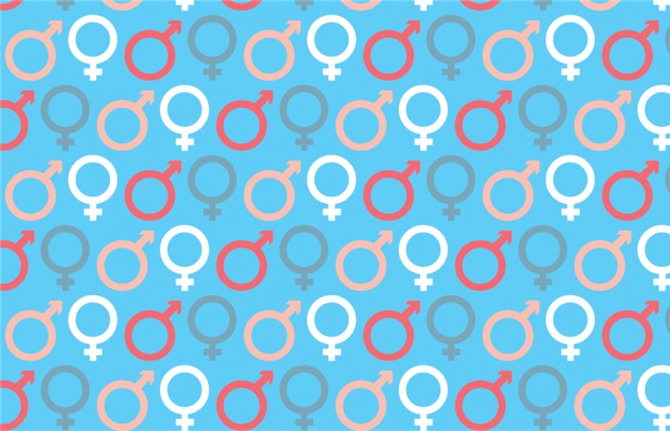
Press Statement
UNAIDS Secretariat launches Gender Action Plan 2018–2023
05 June 2018 05 June 2018GENEVA, 5 June 2018—UNAIDS has launched its new Gender Action Plan for 2018–2023. The plan builds on the progress achieved under the 2013–2018 plan, which provided a framework to advance gender equality and empower women across the UNAIDS Secretariat.
Some 54% of UNAIDS staff are women and the UNAIDS Secretariat has achieved gender parity among staff at the P4 level (middle management) and above. The highest rise in women in leadership positions has been among UNAIDS country directors—in 2018, women accounted for 48% of UNAIDS country directors, up from 23% in 2013. UNAIDS has also developed a unique Women’s Leadership Programme and a Mentoring Programme for Women.
“The Gender Action Plan goes beyond parity—It’s about empowerment and it’s about rights,” said Michel Sidibé, Executive Director of UNAIDS. “Staff are the greatest resource of the United Nations and I commit to ensuring the resources, the programmes and the support to empower all UNAIDS staff to improve the lives of people living with and affected by HIV.”
UNAIDS has performed consistently well within the United Nations System-Wide Action Plan on Gender Equality and the Empowerment of Women and is recognized as the only United Nations entity to have achieved full compliance with all 15 performance indicators.
The new plan seeks to build on this progress, while establishing new and more ambitious targets. “The UNAIDS Gender Action Plan is a tool for change,” said Gunilla Carlsson, Deputy Executive Director of UNAIDS. “A tool to help create a workplace that maximizes the positive power of equality and diversity, where women and men are empowered to pursue a fulfilling career, free of discrimination and harassment of any kind. I am proud to launch it as part of the UNAIDS five-point plan to prevent and address all forms of harassment within UNAIDS.”
The UNAIDS Gender Action Plan sets out four targets:
- Target 1: 50:50 gender parity across all staff levels and categories.
- Target 2: 100% of staff at all levels set a work and learning objective on gender.
- Target 3: 100% of eligible UNAIDS female staff to participate in the UNAIDS Women’s Leadership Programme and 100% of eligible UNAIDS staff to participate in the Mentoring Programme for Women.
- Target 4: 100% compliance with the United Nations System-Wide Action Plan on Gender Equality and the Empowerment of Women 2.0 framework.
To reach these targets and achieve an organizational culture that fully upholds gender equality and diversity, the UNAIDS Secretariat will be carrying out regular and transparent reporting to all staff on the progress and challenges, while also reporting to its Programme Coordinating Board.
A Challenge Group will be created, composed of staff from across the organization, which will be tasked with pushing progress forward and holding UNAIDS’ leadership accountable for the successful implementation of the plan.
Through the implementation of the Gender Action Plan 2018–2023, UNAIDS will continue to lead the way in accelerating gender equality and empowering every staff member to live up to their full potential.
UNAIDS
The Joint United Nations Programme on HIV/AIDS (UNAIDS) leads and inspires the world to achieve its shared vision of zero new HIV infections, zero discrimination and zero AIDS-related deaths. UNAIDS unites the efforts of 11 UN organizations—UNHCR, UNICEF, WFP, UNDP, UNFPA, UNODC, UN Women, ILO, UNESCO, WHO and the World Bank—and works closely with global and national partners towards ending the AIDS epidemic by 2030 as part of the Sustainable Development Goals. Learn more at unaids.org and connect with us on Facebook, Twitter, Instagram and YouTube.
Press centre
Download the printable version (PDF)
Documents
UNAIDS Gender Action Plan 2018–2023 — A framework for accountability
05 June 2018
Gender equality in the workplace is a human right and critical to the performance and effectiveness of UNAIDS. Organizations with more equal representation of women at the senior management level considerably outperform their counterparts with a lower representation of women in senior positions. Gender-balanced teams have greater potential for creativity and innovation and contribute to better outcomes in decisionmaking. The centrality of advancing gender equality, including through the achievement of gender parity, is increasingly being recognized, as signalled by the historic System-wide Strategy on Gender Parity, launched by the United Nations Secretary-General in 2017.


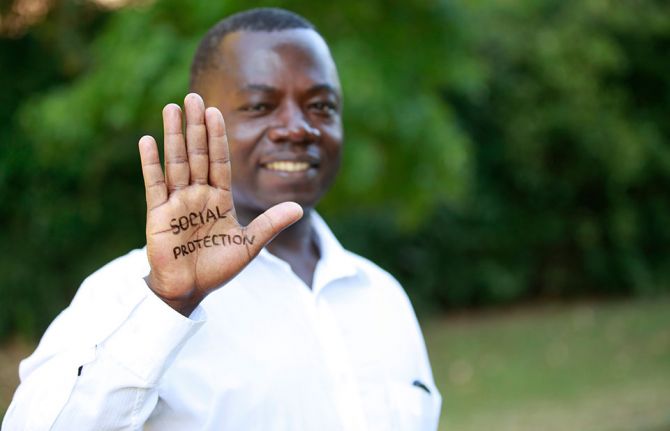
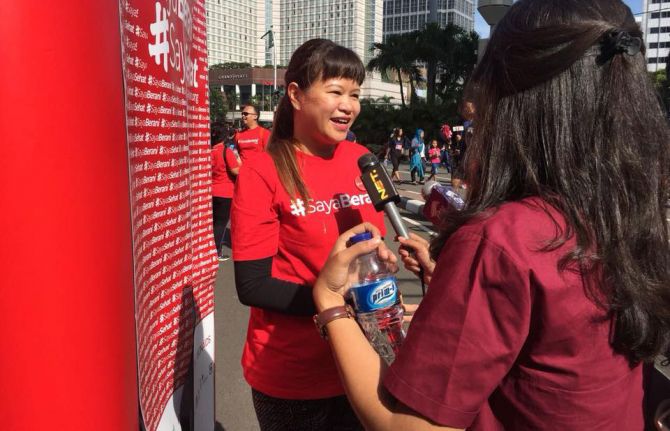
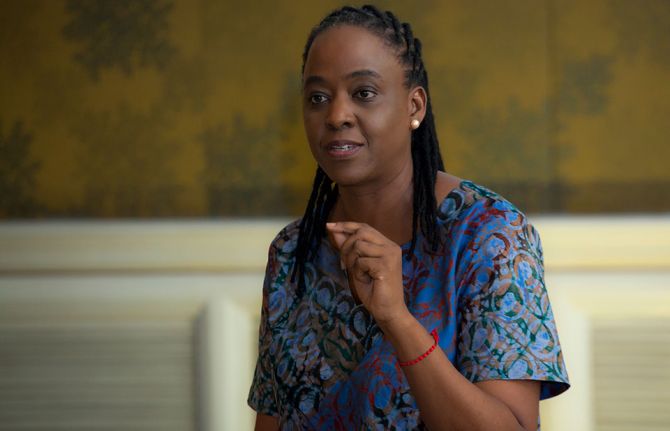
Feature Story
Bringing about change
25 April 2018
25 April 2018 25 April 2018David Chipanta started his UNAIDS career in Liberia as the UNAIDS Country Director, where he helped to strengthen the national AIDS commission and national strategy framework. He is particularly proud of putting gender and ending sexual violence front and centre in the AIDS response in the country and giving the national network of people living with HIV more of a voice.
“What I found exciting was tackling the many barriers that surround access to HIV treatment, prevention, care and support,” he said. By barriers, he means the stigma, discrimination, poverty and inequalities that constrain people from accessing HIV services.
An economist by training, Mr Chipanta remarked, “We cannot forget the importance of all the things that relate to people’s lives—do they feel secure, do they have food, do they have a house, a family, a job?” Giving the example of Zambia, he described some people only taking their HIV medicine during the rainy season because food is more readily available then.
“It hit me that the peripheral stuff is very important, because without it HIV services will have a limited impact,” Mr Chipanta said. His current job as the UNAIDS Social Protection Senior Adviser in Geneva, Switzerland, focuses on just that—connecting people affected by HIV to social safety nets and improving livelihoods, as well as reducing poverty and improving education.
“UNAIDS has created more awareness about social protection services and the hurdles that people living with HIV face,” he said. For example, he explained that in Liberia and Sierra Leone, sex workers said they weren’t accessing social protection services because the administrators often treated them badly; in response, his office set up sensitivity training.
Another issue close to his heart is girls’ education. Keeping girls in school has been shown to lower HIV prevalence and is an important factor in increasing access to HIV treatment. “In low-income settings, we shone the light on the importance of cash transfers to keep girls in school,” Mr Chipanta said. His next challenge is advocating for more synergies with programmes for mentoring, empowerment and social support.
“As a person living with HIV, I never thought I would accomplish so much,” he said. In 1991, when he found out his HIV status in his native Zambia, he assumed that his life was over. “I thought, before I die, let me help others,” he added.
“I was personally motivated to work in the HIV field,” he said. “But I felt like I wanted to become an expert in my own right.”
Krittayawan (Tina) Boonto reflected on her 20 years at UNAIDS by also saying she couldn’t believe how far she had got. Ms Boonto started work in her native Thailand before moving to Geneva.
“It was supposed to be temporary, but I stayed seven years,” she said.
She then went to Indonesia as the Programme Coordination Adviser in 2005. She helped the Ministry of Health with technical support and accessing financial resources from the Global Fund to Fight AIDS, Tuberculosis and Malaria. That experience proved pertinent, because in 2010 she moved to Myanmar as the Senior Investment and Efficiency Adviser.
“The country was opening up at that time, so my field experience in other countries came in handy,” she said. For example, UNAIDS advocated to decentralize the provision of antiretroviral medicines so that people from rural areas could get their treatment at primary health-care centres without traveling to the main cities.
“It was so rewarding to be on the ground and witness the change.” According to Ms Boonto, antiretroviral medicine access shot up to more than 120 000 people accessing the medicines, up from 30 000 people in three years.
“That’s when I realized that it’s not just about money, it’s also about the willingness to change,” she said.
A year ago, she returned to Indonesia, but this time as the UNAIDS Country Director. It’s been challenging for her because despite the scale-up when she was in the country the first time, Indonesia lags behind its neighbours, such as Thailand and Myanmar, in terms of antiretroviral medicine access and reducing new HIV infections. “It ranks third after India and China in the region in terms of new HIV infections,” Ms Boonto said.
Her tactic has been to raise HIV awareness among decision-makers and stress to them that the epidemic is not under control. “We present data and push to keep HIV a priority,” she said. Recently, she has been knocking on doors to raise alarm bells about tuberculosis—a disease that remains one of the leading causes of death among people living with HIV, despite being treatable and preventable.
“It all boils down to political will and getting the autonomous country districts on board once the Ministry of Health approves,” she said. Not flinching, Ms Boonto said, “My job never lets me forget what I am working for: people living with HIV.” She added, “We are still relevant and are still much needed, and that is the greatest satisfaction of all.”
Satisfaction for Catherine Sozi has been observing the shift from, “How can we roll out treatment for so many people, to getting 21 million people on treatment in the space of 10 plus years,” she said. In her third stint in South Africa, she feels UNAIDS’ advocacy work has paid off. Recalling a conversation she had in Zambia with the government when she worked there 15 years ago, many feared that the money and support would not come if countries started to offer antiretroviral medicines. “I made the case that money would come based on the countries’ growing commitment and that we would work to get the prices down,” she said. In 2005, prices for antiretroviral medicines were high. “The governments listened to us and to civil society and, based on solid results in 2015, it suddenly looked feasible to put an end to AIDS,” Ms Sozi said.
As the Regional Director for the eastern and southern Africa region, she is thrilled by the positive energy in the region, despite the many challenges remaining. “A lot still needs to be done to stop new HIV infections, get even more people on treatment and have them stay on treatment, and that includes testing even more adolescents, children and adults for HIV, including key populations,” she said. Another big issue involves tackling rampant sexual violence, which leads in part to higher numbers of new HIV infections among girls and young women, she explained.
“In this case, a biomedical response won’t help. We need to change how we relate to households, the police and the legal system and get faith leaders, women activists, nongovernmental organizations and men involved to turn things around,” Ms Sozi said. Trained as a doctor in Uganda, she admits that her career has propelled her into a much wider arena than she had ever anticipated.
“The UNAIDS women’s leadership programme empowered me to become a leader and reassured me that I could manage a large, diverse staff as well as resources and still be technically strong,” she said.
Her four years as the UNAIDS Country Director in China, before her latest move to South Africa, proved to be very enriching on a personal and professional level. “As a family we had a wonderful time in a country that is in itself so diverse in all aspects,” she said. The commitment by the government and civil society to work on the epidemic was both invigorating and challenging.
One of her biggest accomplishments in Asia was her contribution to the China–Africa health dialogue. “For me, to support the South–South dialogue on China–Africa health cooperation meant a lot,” Ms Sozi said. “I see myself as a facilitator of change.”
MORE IN THIS SERIES
UNAIDS staff share global experience on AIDS through criss-crossing the world
It’s about the people we serve: UNAIDS staff connecting the world
More in this series

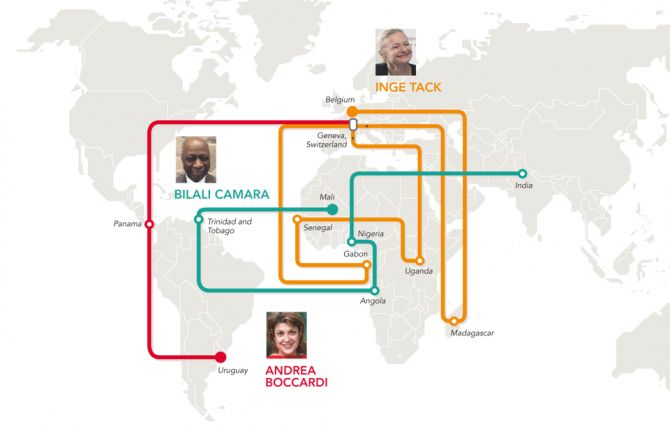
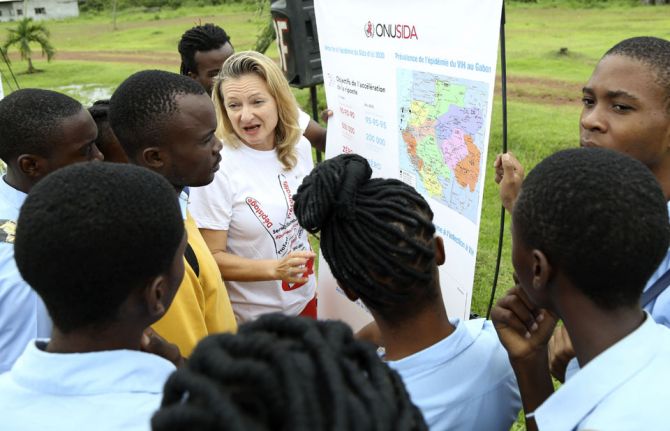
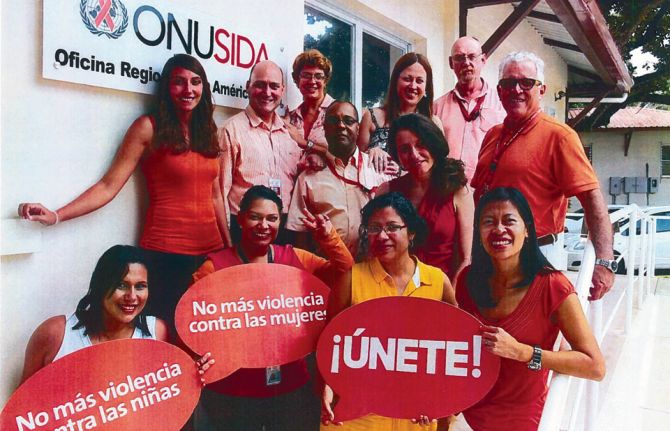
Feature Story
It’s about the people we serve: UNAIDS staff connecting the world
29 March 2018
29 March 2018 29 March 2018“Partnerships, partnerships, partnerships,” said Inge Tack. “That’s what motivates me every morning.”
Partnerships are also her background. When she joined UNAIDS in 1999, she worked on a new initiative, the International Partnership against AIDS in Africa, which involved getting buy-in from governments, the private sector, the United Nations and communities. She then moved to Uganda as the Technical Adviser helping the national AIDS commission with its various constituencies. Ms Tack then headed to western Africa, to the UNAIDS regional bureau to become the Partnerships Adviser.
“I travelled to many of the 19 countries in that region, where travelling is not easy, but I loved the job,” she said. “Supporting country offices, being the broker and convener at the regional level for governments, regional economic communities, donors and people living with HIV in a challenging environment was definitely a huge learning experience,” Ms Tack said. Gaining everyone’s trust was key, she added. She also relished the role because UNAIDS’ neutrality and expertise, she explained, made it the go-to office for HIV.
In 2012, Ms Tack became UNAIDS Country Director in Gabon, allowing her to zero in on one country. “I was the boss of a very small team, but with an enormous scope to do it all,” she said. The variety thrilled her.
“I never had a dull day in Gabon,” she said describing a typical day, which could take her to the presidential palace in the morning, an HIV workshop in the afternoon and an evening meeting discussing health with investors.
Aside from partnerships, she forged real connections with people.
“At the end, it is all about people, giving them hope and encouraging them to help each other,” Ms Tack said. A lot of young people have limited opportunities, so she became a sort of cheerleader for them.
In one case, a young mother living with HIV came to her office saying she could no longer bear her life. Ms Tack sensed that the young woman could perhaps share her story with other teens. “It blew me away how she recounted her tale and connected to people,” she said. Slowly but surely, the young woman gained confidence. The Gabon office helped launch a network for young people living with HIV to raise awareness about HIV prevention and to guide people on adhering to treatment. “And you know what?” she asked. “That woman now has become a community health worker, paid for by the local mayor’s office,” she said beaming.
Ms Tack’s new job in the Programme Partnerships and Fundraising Department has brought her back to Geneva, Switzerland, closer to her native Belgium. Fundraising has changed so dramatically that she wanted to come back to headquarters and refresh her skills. “I believe it’s important to match funds to real country needs,” she said. She also thinks that UNAIDS needs to innovate more on raising funds. Looking up from her computer, she said, “When I feel like I have gotten a good handle on that, then I can return to the country level and put it into implementation!”
UNAIDS staff work in 79 country offices and six regional offices and at its headquarters in Geneva. It also has liaison offices at the United Nations Headquarters in New York and in Washington, DC, United States of America, and at the African Union in Addis Ababa, Ethiopia. The nearly 700 staff members come from 123 countries and more than 60% of the staff work in the field.
Bilali Camara joined UNAIDS in 2008 in Trinidad and Tobago as a Regional Monitoring and Evaluation Adviser. “I had to establish a strong network at national levels across the Caribbean,” he said. This involved a lot of sharing of lessons and problem-solving, he explained. When he moved to Angola as the Country Director, his networks involved fewer people, but he networked tirelessly. He’s particularly proud of having connected a basketball coach with a radio director to air zero discrimination messages. For the next campaign he asked a famous musician, a transgender singer, to help. As a result, he said, they reached thousands of people with HIV awareness messages.
Mr Camara reiterated this endeavour when he became the Country Director in Nigeria. In this instance, he explained, the real push involved lowering the number of babies becoming infected with HIV. Too few pregnant women knew their HIV status and their babies were being missed by HIV services. “We had to reach people, and the best way to do that was contacting them by phone,” Mr Camara said. UNAIDS Nigeria partnered with a telecom company and millions of people received HIV prevention text messages. “With that momentum, HIV testing became part of the prenatal care package in the country,” he said.
Mr Camara said that what keeps him moving forward is people tell him that they appreciate what UNAIDS has done.
Forward and onward he has gone. Mr Camara just became the UNAIDS Country Director in India. What has struck him so far is how involved the key populations are in the AIDS response. “The level of ownership here has truly impressed me,” Mr Camara said. “When it comes to public health, if communities lead the way, then that is a sign of success.”
Success for Andrea Boccardi saw her start out as an obstetrics and gynecology doctor advising Uruguayan Army peacekeeping operations and learning about the HIV policy and programming of the United Nations Department of Peacekeeping Operations. She now focuses on gender-based violence and the elimination of discrimination.
“It’s a dream come true,” she said. “I now have the opportunity to implement the UNAIDS vision of zero discrimination in health-care settings.” Standing in her office, her walls decorated with certificates and photos of Uruguay, Panama and Geneva, she explained how privileged she has felt to have moved around the world and departments.
In 2003, UNAIDS hired her as an HIV Adviser on Security and the Humanitarian Response in Latin America, ending her career as a military doctor. She recalls that her past job came in useful when she trained United Nations peacekeeping troops deploying to Haiti and the Congo.
Two years later she transferred to Panama. Ms Boccardi helped open the UNAIDS regional office, working on programming and technical support. “I did a lot of running around trying to make sure that we were on top of human rights, prevention, treatment and universal access to health,” she said, sighing at the thought of what that entailed.
When her rotation came up, Ms Boccardi said she wanted to move beyond policy and work towards the UNAIDS global prevention agenda to bring change on the ground. Her transition to headquarters in Geneva was seamless. She described her daughters having a tougher time with the French homework, but overall loving the independence that the vast Swiss bus and train system gives them.
In the past 10 years, nearly 500 staff have participated in mobility and more than 400 staff have been reassigned to multiple duty stations. In 2018, about 30 staff members will move from their current posts to new posts.
After working on prevention, Ms Boccardi recently joined the Human Rights and Gender Team.
Pointing to the Spanish words engraved at the bottom of a framed pre-Columbian small gold frog by her desk that read, “Leader, guide, friend”, Ms Boccardi said this had become her mantra in life to balance work, family and friends.
More in this series: UNAIDS staff share global experience on AIDS through criss-crossing the world

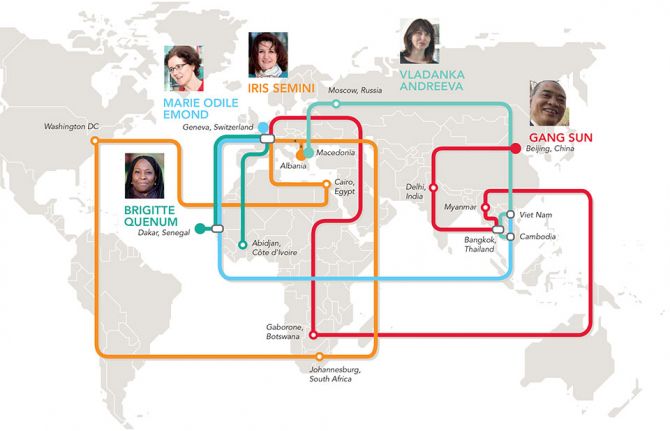
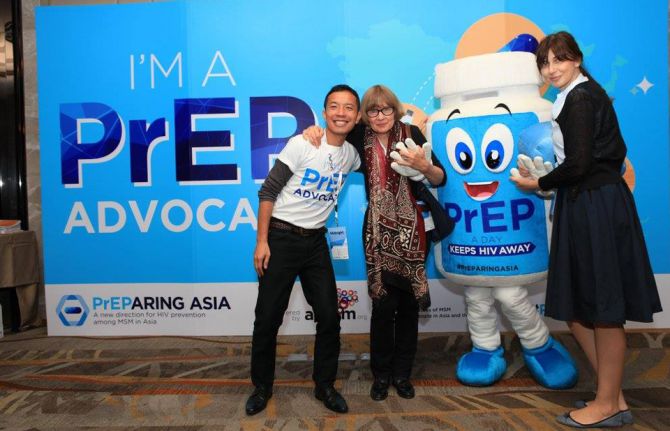
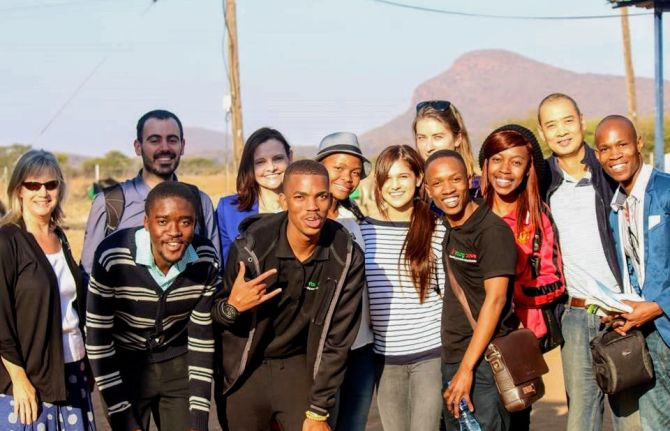
Feature Story
UNAIDS staff share global experience on AIDS through criss-crossing the world
19 March 2018
19 March 2018 19 March 2018When Marie-Odile Emond first arrived in Cambodia, she didn’t realize that some of the UNAIDS/International Labour Organization policy on HIV in the workplace she had heard discussed, years back, at the global level would be something she would see implemented.
“It seemed so abstract and yet here I was seeing it in practice,” she said, referring to health and human rights protection for workers, notably sex workers, which involved the Ministry of Labour, the community and the United Nations. “As the Country Director, I facilitated the dialogue and training for that to happen,” Ms Emond said, “and now it serves as an example for other countries.”
She now heads the Viet Nam Country Office, which she said offered another set of challenges and opportunities.
“I have found it really interesting to alternate between global, regional and country offices, because each offers a window to a part of our strategy,” Ms Emond said. Rattling off the many countries she has worked in at UNAIDS, she laughed and said, “Oh, and before UNAIDS, I worked in Armenia, Burundi, Liberia and Rwanda.”
In her opinion, meeting so many committed people from all walks of life and building bridges with them has been enriching. It’s made all the difference, according to her, in the AIDS response. “I play the coordinator, but I also had an active role in making people believe in themselves,” Ms Emond said.
Country Director Vladanka Andreeva said that her moves within UNAIDS were a huge change each time. She has served across two regions in different roles and credits her professional growth to her colleagues and the various communities she has interacted with.
“In every new post there was a challenge to quickly adapt to it, establish relationships with stakeholders and make a contribution,” she said. “You really have to hit the ground running.” Her role as the Treatment and Prevention Adviser in the UNAIDS regional office in Bangkok, Thailand, before going to Cambodia, really stands out for her. Ms Andreeva provided technical advice and assistance to strengthen HIV programmes across the region. This involved facilitating knowledge and sharing best practice, in and between countries, on innovative delivery models to scale up access to evidence-informed services.
She added that, from the former Yugoslav Republic of Macedonia to Cambodia, “my family and I explored the cultural heritage of our host countries, tasted some of the most delicious pho, tom yum and amok, and made friends from all over the world.”
She thanked her husband and daughter for being fantastic partners in the journey, since moving every four to five years is no small task. UNAIDS staff move routinely from one duty station to another, criss-crossing the world throughout their careers.
Her real pride is seeing her 17-year-old daughter, who was six when they started living abroad, become a truly global citizen, with such respect for diversity.
Gang Sun echoed many of Ms Andreeva’s points. “Because we interact with so many stakeholders, from the private sector to government to civil society, I have learned to always show respect and always listen,” he said.
For him, the journey started in the field in China, India and Thailand, followed by Myanmar and Botswana, before starting his new job at UNAIDS headquarters in Geneva, Switzerland, in 2017. He described that adapting to different cultures has kept him on his toes. “Overall, in my career I have seen every challenge as an opportunity and I have gained in confidence,” he said.
What fascinated him the most was the differences between working in high HIV prevalence countries and in countries where the epidemic was concentrated among key populations. In his new role at headquarters, he now taps into his expertise gained along the way as well as that of so many colleagues within UNAIDS and the World Health Organization.
“Despite all my experience, I still have more learning to do,” Mr Sun said.
The Côte d’Ivoire Country Director, Brigitte Quenum, jumped at the opportunity to go to the field after more than five years in Geneva. As the Partnerships Officer with francophone countries at UNAIDS headquarters, she said she learned a lot about how the UNAIDS Joint Programme functioned. That has helped her in her current role working hand in hand with Cosponsors, financial partners and civil society.
Before working in Geneva, she worked in the western and central Africa regional UNAIDS office in Dakar, Senegal. “I have gone full circle, and that has been very rewarding, because I know how the entire organization functions,” Ms Quenum said. Reflecting on the recent change in her life, aside from adjusting to the muggy coastal weather and the sheer population size of Abidjan, Côte d’Ivoire—the city has as many people as all of Switzerland—she said, “Being on the ground gives one’s job more of a sense of urgency, but I think it’s because we have daily contact with the multiple communities we’re serving.”
More in this series: It’s about the people we serve: UNAIDS staff connecting the world
Related


Feature Story
UNAIDS a top-nine gender-responsive organization
08 March 2018
08 March 2018 08 March 2018UNAIDS has emerged as a top performer in the first Global Health 50/50 report.
Global Health 50/50, an initiative that monitors the gender-responsiveness of influential global health organizations, reviewed 140 major organizations working in or influencing global health. According to the new report, UNAIDS is among the top nine health organizations in the world.
Published on 8 March, International Women’s Day, the Global Health 50/50 report was inspired by a growing concern that too few global health organizations define, programme, resource or monitor gender in their work on health or in the workplace. The report aims to show both the challenges and the way forward.
The report shows that UNAIDS has not only policies that address gender, but also concrete and time-bound gender parity targets, as set out in its Gender Action Plan. Under the plan, UNAIDS has seen the proportion of female staff rise, so that women account for 54% of UNAIDS staff. And female leaders in the field are increasing, with women accounting for 48% of UNAIDS country directors, up from 27% in 2013.
“The Global Health 50/50 survey has shown that UNAIDS’ commitment to gender equality is strong. I am resolved to building on our results and achieving all the targets of the UNAIDS Gender Action Plan,” said Michel Sidibé, Executive Director of UNAIDS.
In addition to its commitment to gender equality and its workplace gender policy, UNAIDS was marked highly for having a definition of gender in its public statements, strategies or policies and having a programmatic gender strategy that seeks to improve health for everyone.
UNAIDS has long strived for gender equality and women’s empowerment, both within the UNAIDS Secretariat and elsewhere, and has recently started to review its practices and recommitted to ensuring adherence to them.
Guaranteeing the rights and empowerment of women and girls is not only a moral obligation, but a development imperative and a smart investment that safeguards the health of women and girls. Eliminating gender inequalities is one of the 10 Fast-Track commitments that Member States made at the 2016 United Nations General Assembly High-Level Meeting on Ending AIDS.
UNAIDS
The Joint United Nations Programme on HIV/AIDS (UNAIDS) leads and inspires the world to achieve its shared vision of zero new HIV infections, zero discrimination and zero AIDS-related deaths. UNAIDS unites the efforts of 11 UN organizations—UNHCR, UNICEF, WFP, UNDP, UNFPA, UNODC, UN Women, ILO, UNESCO, WHO and the World Bank—and works closely with global and national partners towards ending the AIDS epidemic by 2030 as part of the Sustainable Development Goals. Learn more at unaids.org and connect with us on Facebook, Twitter, Instagram and YouTube.

